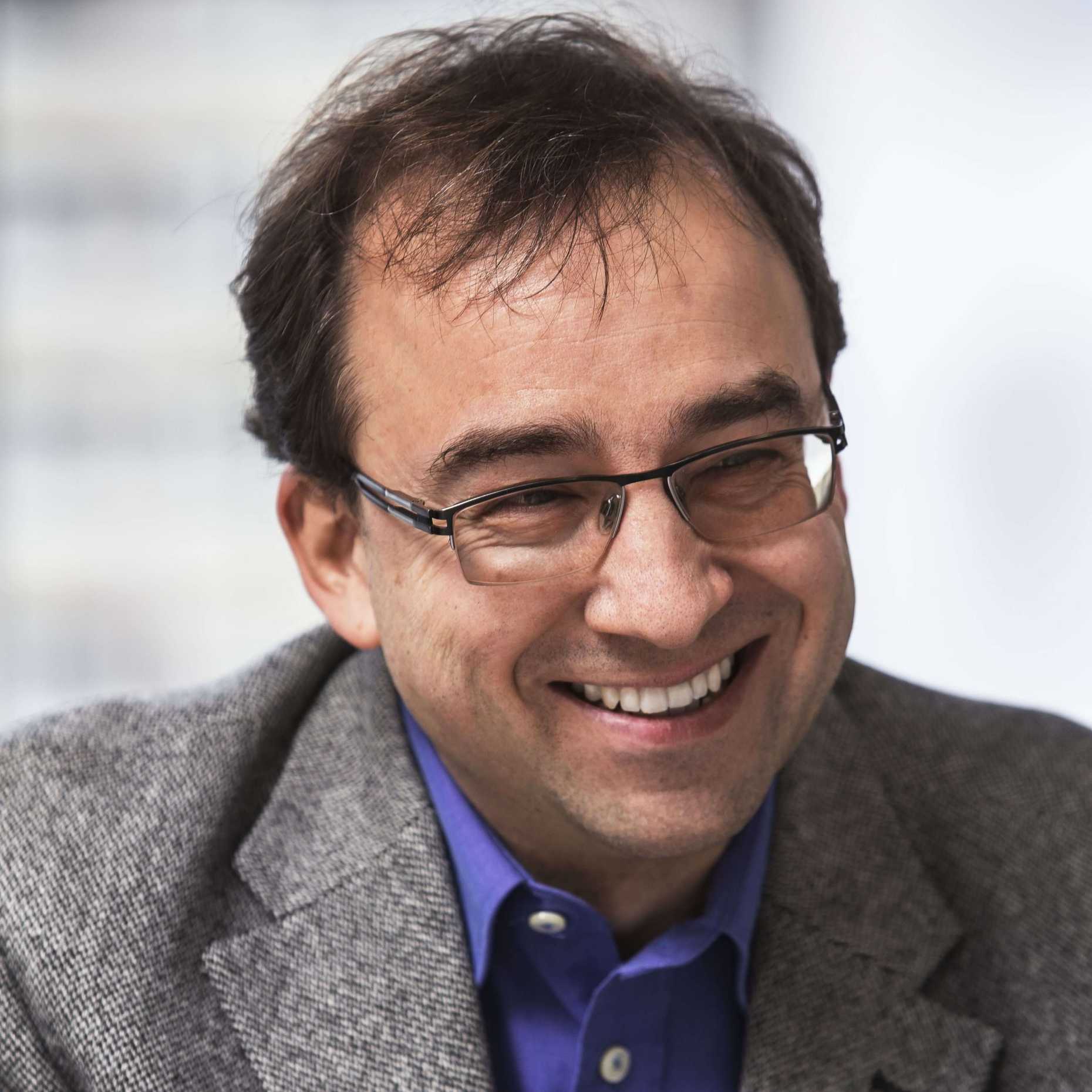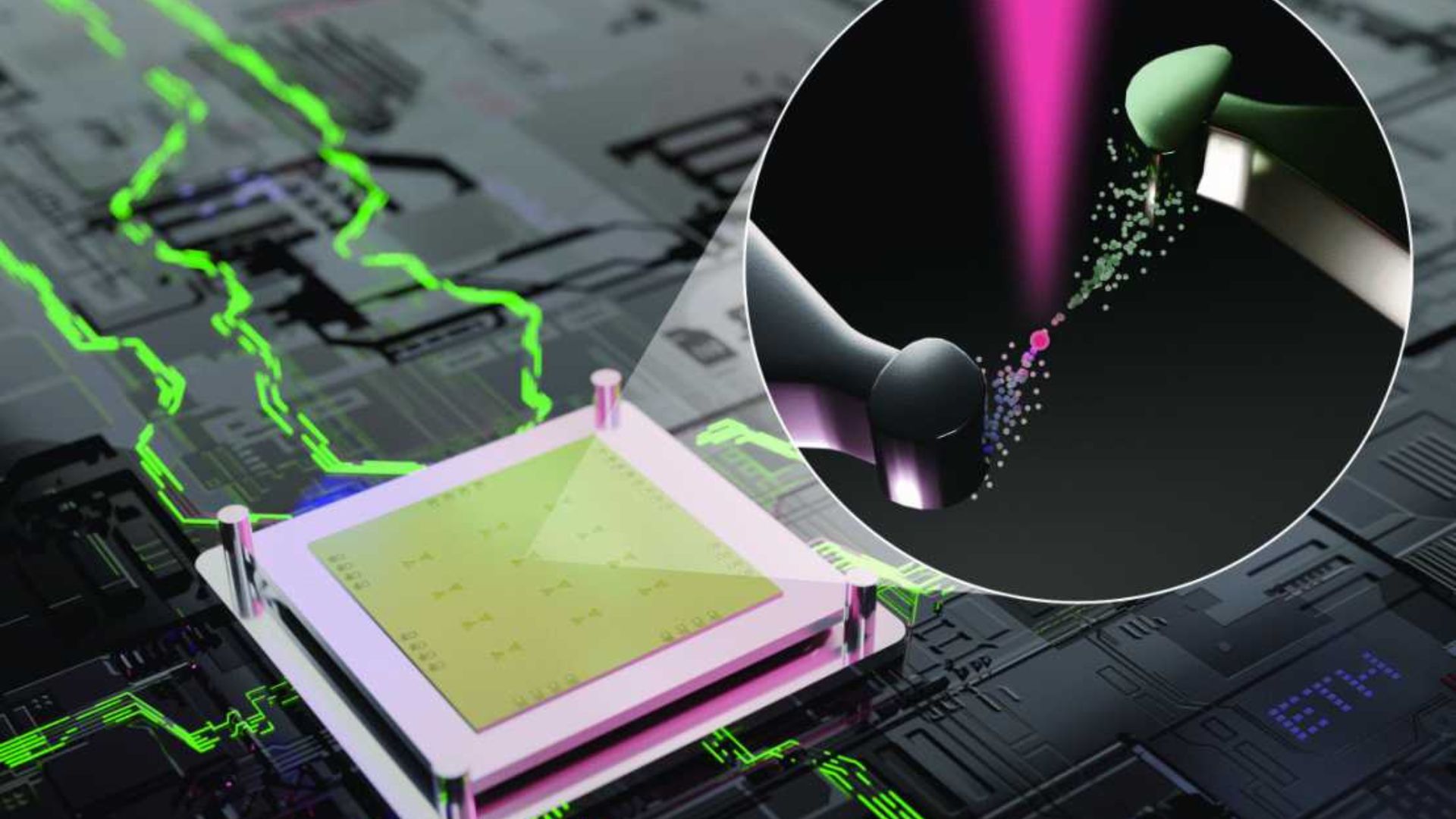"If you have competition in your field, you're doing research on an important topic"
Jürg Leuthold is Professor of Photonics and Communication at the Department of Information Technology and Electrical Engineering. In this interview, he talks about his research areas and their challenges, as well as the changes he would like to implement as new Head of Department.
Prof. Leuthold, what is your research focus?
We conduct research in the field of photonics and terahertz and strive to produce the smallest, fastest and most energy-efficient components in the world. Applications are in the field of optical fiber communications and mobile communications, as well as sensor technology, e.g., CO2 sensors.
Can you name a specific research project?
At the moment, we are working with a medical institute in Tübingen on an eye project called RetinaSensor. The human eye is extremely sensitive. We can see in bright daylight, but we are also able to detect light with just a few photons at dusk. We want to construct a chip that comes close to what the eye can do. The idea is to replace a destroyed retina with a new sensor so that blind people can see again. The sensor for this needs to be super small, compatible with tissue, and have very high resolution.

“We strive to make the smallest, fastest, and most energy-efficient devices in the world, for applications in communications and sensing.”Prof. Jürg Leuthold
What brought you to this field? You studied physics at ETH Zurich. Tell us briefly about your career.
When choosing my career, I found nuclear and particle physics very interesting, but then I was a bit put off by the large research groups and had the feeling that I could only be a small cog in the wheel there. How I got into photonics was then a bit of a coincidence. When I wanted to start my diploma thesis in quantum photonics, the professor there moved away. So, I ended up in an institute where they did photonic communication. After my PhD, I went to Bell Labs in America to do research, and after a little more than five years I was called to Karlsruhe to KIT, where I took over the Institute for Quantum Electronics. In 2011, I became director of a Helmholtz institute at KIT. Since 2013, I have been back at ETH Zurich as a full Professor of Photonics and Communication at the interface of physics and electrical engineering.
What fascinates you about photonics?
The interesting thing about photonics is that an individual can carry out a project from start to finish. My institute is organized in such a way that you can do everything from conceptual invention to simulations to clean room fabrication to characterization to the completed system. I was also fascinated by the complexity of light. We do research here with and on quantum particles, which have electrical and magnetic properties. Just interpreting what can happen there in complex space is often challenging. Incidentally, photonics is a field that interests both science and industry.
What is the impact of your research on society?
I am proud to say that at least one of my components was used in industry for years. Between about 2005 and 2015, there was a communications receiver used around the world based largely on my work and that of my colleagues.
There is also a lot of industry-relevant work among the ongoing projects. Of course, one hopes that one or the other idea will be taken up by industry. Recently, we worked on one of the first Tbit/s satellite links for Internet data transmission. New techniques were used, which are of interest to various companies. By the way, the experiment was extraordinary: Since we could not go into space, we tested our components on a free-beam link between the Jungfraujoch and Bern. That is about 53 kilometers. For such experiments, we can manufacture the components in-house and then carry out everything up to the system test ourselves.
We are currently working with our start-up Polariton to commercialize components that we have invented here. It's about optical coding of electrical data for the fiber optic network. There is a standard method for this with modulators about the size of a finger. Our modulators, on the other hand, are perhaps the size of a dot drawn with a pencil. Because they are so small and compact, they are also much faster and require about a hundred to a thousand times less energy than commercially available modulators.

What are currently the biggest challenges in your field of research?
We cannot rest or we will be overtaken. I always say, "If you have competition in your field, you're doing research on an important topic." And indeed, our field is evolving at breakneck speed. Twenty years ago we had modems with 128 kbit/s, now we are at one Gbit/s. There is a factor of 10,000 in between. These are incredible developments to keep up with. Many of the paradigms that used to be correct are now outdated or have been proven wrong.
In our research, we have repeatedly developed completely new techniques that you don't discover if you continue to research in a linear fashion. For example, a focus on further miniaturization is too one-dimensional. Several times, development has taken a different direction, so this exponential growth can still continue. But I certainly don't want to argue against miniaturization. After all, my group is also working in the field of single-atom research. You can also switch very well and reliably with a single atom. But you can't get there with old ideas.
With which colleagues within and outside the department do you have collaborations?
Within the department, we mainly collaborate with colleagues from optics and photonics. Recently, we submitted a paper with Maksym Yarema and Vanessa Wood. We also have a larger project with Mathieu Luisier and have a collaboration with Hua Wang. We also have common interests and joint publications with Lukas Novotny, who heads the Photonics Laboratory. And then there are many colleagues with whom we have inspiring discussions and with whom we would like to work - if only we had enough time. Furthermore, there are collaborations with other departments, throughout Switzerland and within the EU.
Cooperation can continue despite Switzerland's exclusion from Horizon Europe, the EU's framework programme for research and innovation?
Let's put it this way: We are still a sought-after partner in EU projects. What has disappeared or changed is that we can no longer coordinate projects and we are no longer allowed to participate in the projects of the European Research Council (ERC). That is certainly a disadvantage for us. Especially with ERC, the review process is very sophisticated. Unfortunately, this does not work to the same extent, yet for the replacement projects carried out by the SNSF.
How is your group composed? Are you currently looking for doctoral students?
Yes, I am looking for people who are willing to take part in this sporting competition. I generally take doctoral students first who have completed their Master's degree here and have already done work with us. I think my group is currently composed in a similar way to our Master's students, i.e. about one third Swiss and two thirds from abroad. The foreign doctoral students then also come from all over the world, from Japan and China, Ukraine to Canada. In terms of subject composition, my group is very interdisciplinary: we have a good 25 members in total with backgrounds in electrical engineering, mathematics, physics, materials science and mechanical engineering.
What lectures are you giving this semester and next semester?
I always give two lectures per semester. This semester they are "Nonlinear Optics" and "Optical Communication Fundamentals," two basic lectures at the Master's level. In the spring semester, I teach "Optics and Photonics," an introductory undergraduate lecture, and "Electrical Engineering I," a service lecture with the mechanical engineers.
Has the Corona pandemic had a lasting impact on teaching?
I think, we have become more flexible. We had to learn to stream our courses in a short time. Even though there was a great deal of discomfort at first about having to look into the camera, we have since gotten used to it. Many students now certainly have better access to the subject matter. On the other hand, the lack of interaction with the lecturer and the fellow students can of course also have a negative effect. It sometimes helps a lot when you look over the shoulders of your colleagues and see: Oops, he's already so far along, where am I?
You will take up the post of Head of Department at D-ITET in January 2023. Which topics are particularly close to your heart and where would you like to possibly set new accents?
In addition to the opening of the GLC building, which is unfortunately a very lengthy process, there are many smaller construction sites, for example: How can we as a department bring our buildings up to a level in terms of energy that will lead us into the future? I would also like to simplify certain administrative processes. And I would like to get to the bottom of this year's decline in Bachelor's students at our department. We have to ask ourselves why this is happening and how we can improve it. Sometimes I get the impression that young people don't know what we are working on in electrical engineering. For those who study with us, we have to make sure that they get through their studies well. But this must not be at the expense of quality. In addition, we must work to ensure that our graduates are finally allowed to teach at high schools in the future. Anyone who has completed an engineering degree at the ETH is also able to teach at a grammar school.